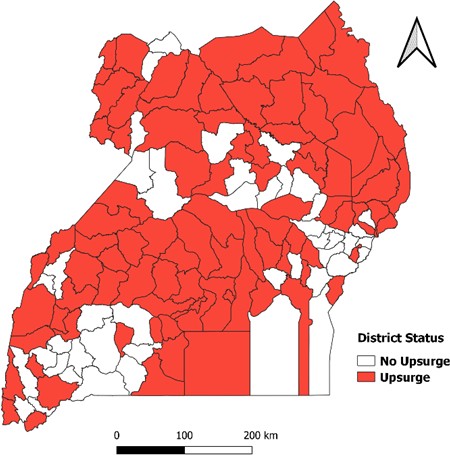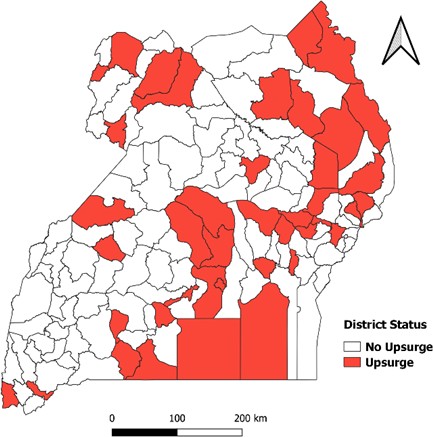MALARIA SITUATION UPDATE AS OF 7TH JANUARY 2020
Aujthor: Phoebe Nabunya, Fellow PHFP
Through routine analysis of malaria surveillance data in the district health Information system (DHIS2) using malaria normal channels, the National Malaria Control Division (NMCD) identified malaria upsurges in 17 districts in march 2019 (Figure 1).

Despite responses by the NMCP and implementing partners (Malaria Action Plan for Districts (MAPD), Presidential Malaria Initiative (PMI), Regional Health Integration to Enhance Services (RHITES), Malaria consortium, Strengthening Uganda’s Response to Malaria (SURMa) including outbreak investigations, redistribution of ACTs, mosquito net distribution in schools, clinical and death audits, and sensitization on prevention measures through mass-media more districts reported increasing malaria cases and by August 2019, 88 out of 138 (64%) districts in Uganda were affected leading the national task force to declare a malaria outbreak in the country. The increase in cases also led to shortages in malaria commodities including RDTS in 40 (34%) districts, ACTs in 45 (33%) districts in the 3rd quarter of 2019 when cases peaked, creating challenges in case management. By the December 2019, the malaria cases registered per week had decreased from 295,000 at the peak of the epidemic in July to 199,000 in December. This decrease has happened across all 88 districts that had the upsurge.
The districts affected by the malaria upsurge de- creased from a peak of 88 registered in July to 41 districts as of January 2020 following intensified responses including delivery of emergency tock to affected districts, redistribution of malaria commodities to stocked out facilities, clinical and death audits, distributing nets, holding mass media campaigns to sensitize the public about the outbreak, and the effective control measures alongside increased vigilance in routine activities including case management and Intermittent Preventive Therapy (IPT) distribution in Antenatal clinics (Figure 2 &3).

The National Malaria Control Division is closely observing Kumi, Nakasongola, and Kisoro that have shown stagnation. The malaria deaths have also decreased from 80 deaths per week at the peak of the epidemic to an average of 40 deaths per week at the end of December 2019. West Nile and Acholi region continue to register the majority of the reported deaths. 22/135 districts in Uganda reported understock (stock <2 months) by the end of December. These are Abim, Amudat, Bukomansimbi, Buliisa, Busia, Buvuma, Buyende, Dokolo, Gomba, Jinja, Kagadi, Kaliro, Kampa- la, Kamwenge, Kassanda, Kazo, Kikuube, Kumi, Kyankwanzi, Manafwa, Mubende, and Soroti.


Comments are closed.